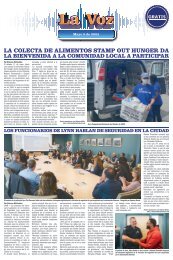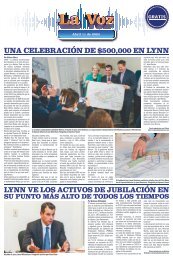You also want an ePaper? Increase the reach of your titles
YUMPU automatically turns print PDFs into web optimized ePapers that Google loves.
JUNE 4, 2020
WEEKLYNEWS.NET - 978-532-5880 35
COVID-19 IRS tax scam alert
Taxpayers should be on the
lookout for federal Internal
Revenue Service (IRS) impersonation
calls, texts and
email phishing attempts about
the coronavirus or COVID-19
Economic Impact Payments.
These scams can lead to
tax-related fraud and identity
theft.
Here is what taxpayers
should know:
• The IRS will not call,
email or text you to verify
or request your financial,
banking or personal
information.
• Watch out for websites and
social media attempts to request
money or personal information.
The official website is
IRS.gov
• Don’t open surprise
emails that look like they are
coming fro the IRS or click
on attachments or links.
• Taxpayers would not provide
personal or financial
information or engage with
potential scammers on line or
over the phone.
• Forward suspicious
emails to phishing@irs.gov,
then delete.
• Go to IRS.gov for the
most up-to-date information.
Here is what people should
know about the Economic
Impact Payments:
• The IRS will automatically
deposit Economic
Impact Payments into the
bank account taxpayers provided
on your 2019 or 2018
tax return for a direct deposit
of their tax refund.
• Those without a direct deposit
account on file may be
able to provide their banking information
online through a new
secure tool, Get My Payment.
• Anyone who is eligible for
an Economic Impact Payment
and doesn’t provide direct deposit
information, will receive a
payment mailed to the last address
the IRS has on file.
• The IRS does not charge a
fee to issue the payment.
Scammer behavior
to watch for:
• Scammers may ask an individual
to sign over their
Economic Impact Payment
check to them.
• Asking for verification
of personal or banking
information.
• Suggesting that they can
get someone a tax refund or
Economic Impact Payment
faster by working on their behalf.
• Issuing a bogus check,
often in an odd amount,
then tell a person to call a
number or verify information
online in order to cash
it. Official IRS information
about the COVID-19 pandemic
and Economic Impact
Payments can be found on the
Coronavirus Tax Relief page
on IRS.gov.
The IRS encourages people
to share this information with
family and friends. Many
people who normally don’t normally
file a tax return may not
realize they are eligible for an
Economic Impact Payment.
Quarantine health and wellness update
This tip sheet describes feelings
and thoughts you may have
during and after social distancing,
quarantine and isolation. It also
suggests ways to care for your
behavioral health during these
experiences and provides resources
for more help.
Everyone reacts differently to
stressful situations such as an
infectious disease outbreak that
requires social distancing, quarantine,
or isolation.
People may feel anxiety,
worry, or fear related to your
own health status and the health
status of others whom you may
have exposed to the disease.
Other feelings include resentment
that your friends & family
may feel as if they need to go
into quarantine as a result of
contact with you.
The experience of monitoring
yourself, or being monitored by
others for signs and symptoms
of the disease can be stressful.
Other stress sources include
taking time off from work and
the potential loss of income and
job security.
• The challenges of securing
things you need such as groceries
and personal care items.
• Concern about being able to
effectively care for children or
others in your care.
• Uncertainty or frustration
about how long you will need
to remain in this situation, and
uncertainty about the future.
• Loneliness associated with
the feeling cut off from the
world and from loved ones.
• Anger if you think you were
exposed to the disease because
of others’ negligence.
• Boredom and frustration
because you may not be able to
work or engage in regular dayto-day
activities.
• Uncertaintyor ambivalence
about the situation.
• A desire to use alcohol or
drugs to cope.
• Symptoms of depression
such as feelings of hopelessness,
changes in appetite, or
sleeping too little or too much.
Ways to support yourself
during social distancing, quarantine,
and isolation include
staying up to date on what is
happening, but limit your media
exposure and look for credible
sources for information.
• Be your own advocate:
Speak out about your needs is
important if you are in quarantine.
Work with others to find
out how you can arrange for
groceries and toiletries to be delivered
to your home and make
sure you inform health care providers
of your medications and
continue to receive them.
• Educate yourself: don’t be
afraid to ask questions, and ask
for written information when
available, even ask a family
member or friend to get the information
for you.
• Work with your employer:
to reduce financial stress & provide
them with a explanation of
why you away from work.
• Connect with others:
Reach out to people you trust
by calling, emailing and using
social media, such as talking
face to face by using Skype or
FaceTime.
• Talk to your doctor: Ask
them whether it would be possible
to schedule remote appointments
via Skype or Face
Time for mental health, substance
abuse, or physical health
needs.
• Use practical ways to cope
and relax: Deep breaths, stretch
mediate or engage in activities
you enjoy and maintain a sense
of hope and positive thinking.
Keep a journal and write down
things you are grateful for.
After social distancing, quarantine,
or isolation, you may
experience mixed emotions,
including a sense of relief. If
you were isolated because you
had the illness, you may feel
sadness or anger because loved
ones may have unfounded fears
of contracting the disease from
contact with you, even though
you have been determined not
be contagious. If you experience
symptoms of extreme
stress such as trouble sleeping
problems with eating, speak to
a health care provider.
If you are feeling overwhelmed
with emotions such as
sadness, depression, anxiety, or
feel like you want to harm yourself
or someone else, call 911 or
the National Suicide Prevention
Lifeline at 1-800-273-TALK
(1-800-273-8255).
We want to hear
from you!
Send us a letter at
editor@weeklynews.net.
Letters should be no more
than 300 words.
Honoring our
Healthcare
Heroes
“I think a hero is an
ordinary individual who finds
strength to persevere and endure in spite
of overwhelming obstacles.”
– Christopher Reeve
To our dedicated staff, thank you for showing your strength and helping us persevere
through these obstacles. Because of you, we are stronger, and our residents feel more
loved than ever. Your hard work, dedication, sacrifice, and commitment to keeping our
community safe makes you a true hero.
Thank you for being part of the Pilgrim Nursing and Rehabilitation team.
96 Forest Street • Peabody, MA 01960
978-532-0303
www.pilgrimrehab.org
We’re Perfecting the Art of Superior Care.

















